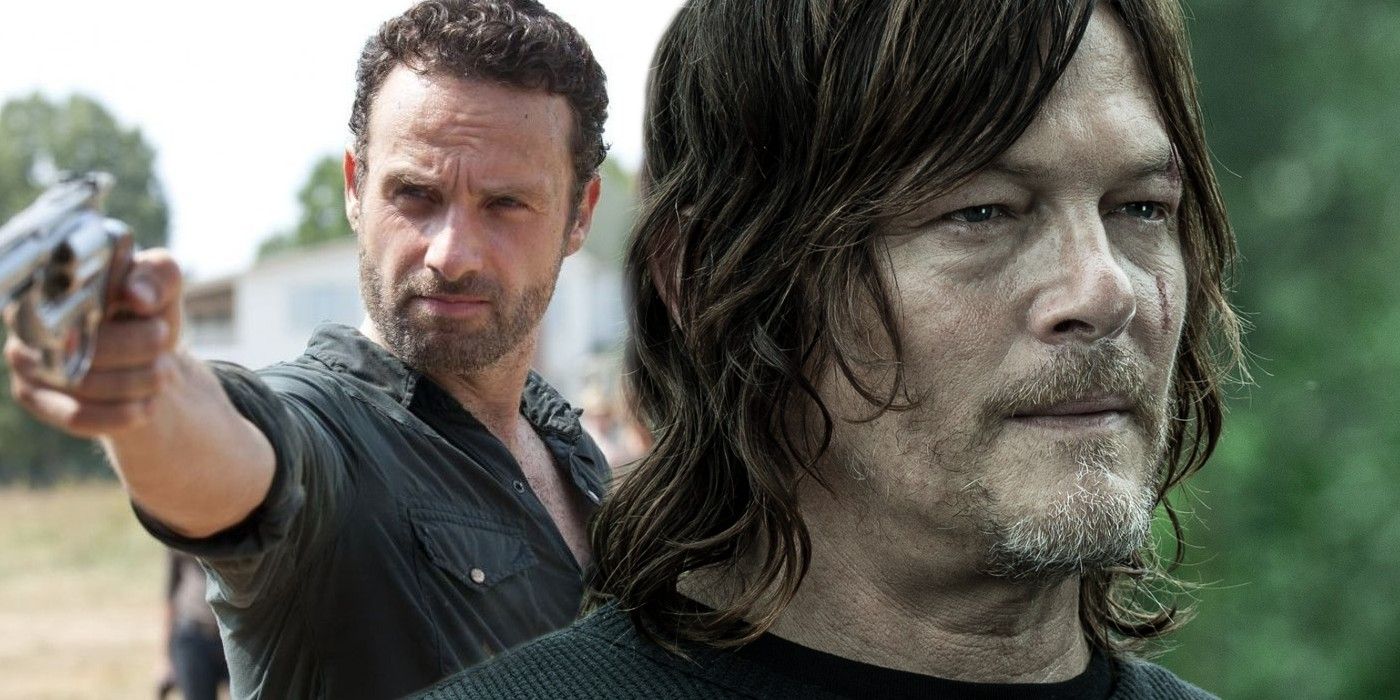The Walking Dead's Commonwealth arc is a perfect demonstration of how Rick Grimes impacted Daryl's development. Infamously, Norman Reedus' Daryl Dixon and Melissa McBride's Carol Peletier are the only remaining survivors from The Walking Dead season 1 (although that could soon change...) A decade of post-apocalyptic living now behind them, it goes without saying that Daryl and Carol have evolved hugely during that time, almost unrecognizable from their original selves. In The Walking Dead season 1, Daryl was surly, aggressive, and renowned for looking after himself first and foremost. Though that gruff exterior hasn't gone anywhere, he's a very different man in season 11.
In fairness, moving to the Commonwealth means everyone is acting differently in The Walking Dead season 11. From the humble surrounds of Alexandria, our survivors have been thrust back into (almost) normal civilization - shops, capitalism, politics, hospitals, etc. It's an abrupt adjustment that every main The Walking Dead character has handled differently, from sneaking into a position of authority (Carol) to pinging straight back to a former career (Ezekiel, albeit with less bite-y animals).
Arguably the most fascinating reaction to joining the Commonwealth, however, goes to Daryl Dixon, who has essentially become the reincarnation of Rick Grimes. When The Walking Dead begins, Rick works as a sheriff's deputy in King County, policing the local community with pride and fairness. Throughout The Walking Dead, Daryl has appeared the least cop-like character one could imagine, his rebellious lone-wolf act the antithesis to a lawman. Yet, shortly after stepping foot in the Commonwealth, Daryl has undergone a metamorphosis into a true cop, donuts and all. The Walking Dead season 11's "The Rotten Core" shows Daryl at ease in this new role, lounging around a police precinct very much like the one Rick would've frequented once upon a time, before heading out to keep law and order in the Commonwealth. It's a sight no one could've imagined when Daryl debuted in The Walking Dead season 1, and the perfect example of a younger sibling striving to meet their older brother's example.
Daryl Dixon's newfound Rick-isms don't end when he clocks out for the day either. Since their real parents are either dead or missing, The Walking Dead season 11 has morphed Daryl into a father figure for Judith and RJ. It's strongly suggested that Daryl's surrogate dad duties motivate him to swallow any nagging sense of pride and follow the Commonwealth's rules obediently, thus ensuring Judith and RJ can live a normal life full of school classes, ice cream, and Motörhead. Protecting children (Rick's children, no less) is a lesson Daryl absolutely would've picked up from Andrew Lincoln's character. Rick famously took any lengths necessary in the name of protecting Carl, whether that be biting a man's face, or temporarily bending the knee to Negan. Daryl perhaps didn't understand those sacrifices back then; in the Commonwealth, he's a shining example of Rick's paternal philosophy.
Between The Walking Dead seasons 1 and 9, audiences watched the bromance between Daryl Dixon and Rick Grimes blossom. Almost immediately, Daryl sensed Rick was a trustworthy ally and a leader he could follow, but with each passing season, Rick become more and more like the brother Daryl wished he'd grown up with (sorry, Merle). Reunited following season 3's prison escape, Rick Grimes affirmed to a visibly touched Daryl, "You're my brother" and after Rick's disappearance in season 9, Daryl spent years searching for a sign of his fate - only giving up long after everyone else already had. The Walking Dead season 11 is now paying off those years of development and bonding by showing Daryl mature into Rick's spitting image.
The Walking Dead continues Sundays on AMC.


